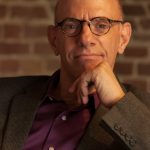By Mark Nepo
 I have felt compelled to speak since the election of Donald Trump but every time I try, my heart sinks and I don’t know what to say. I was born in Brooklyn, New York, six years after World War II, after the defeat of Hitler and fascism, six years after the Holocaust, in which I had family perish. As a child, I saw unfathomable images of how the Atomic bomb obliterated Hiroshima. In grade school, we practiced hiding under our desks, as if that would keep us from being incinerated. I came of age in the sixties, part of a hopeful generation who questioned the war in Vietnam. I later saw the Berlin wall come down, and witnessed the first African-American president sworn in on the steps of a White House built by slaves. During my lifetime, there has been a slow, steady awakening of community that has upheld America as the land of the free. Through all this, I have grown to understand that, different as we are in what we believe, there is no they. We are they.
I have felt compelled to speak since the election of Donald Trump but every time I try, my heart sinks and I don’t know what to say. I was born in Brooklyn, New York, six years after World War II, after the defeat of Hitler and fascism, six years after the Holocaust, in which I had family perish. As a child, I saw unfathomable images of how the Atomic bomb obliterated Hiroshima. In grade school, we practiced hiding under our desks, as if that would keep us from being incinerated. I came of age in the sixties, part of a hopeful generation who questioned the war in Vietnam. I later saw the Berlin wall come down, and witnessed the first African-American president sworn in on the steps of a White House built by slaves. During my lifetime, there has been a slow, steady awakening of community that has upheld America as the land of the free. Through all this, I have grown to understand that, different as we are in what we believe, there is no they. We are they.
Given this paradox inherent in freedom, I have tried to stay true to what I know while listening to the opposite views of others. But the underpinnings of this election fall below politics, below Democrat or Republican. Because half of us have elected a man whose way in the world is built on fear and hate, whose tolerance for difference is tissue paper thin, whose understanding of strength is based on vengeance.
As I witness the level of racism, sexism, xenophobia, and unchannelled anger that is spilling out of us as a nation, I fear that Donald Trump has poked and stirred the darker angels of our nature. Now we are taking our turn, as civilizations before us, in the ever-present challenge to give in to fear or to empower each other to be brave enough to love, brave enough to discover and accept that we are each other.
For no matter where we come from, no matter how we got here, we all yearn to be seen, heard, and respected. We all long to belong and to be understood as whole and good. We all long to be needed. And all our gifts are needed to contribute to the tapestry of freedom.
So I am afraid today, afraid the noise of hate is drowning out the resilience of love that is always near. I fear that we are tripping into a dark age. If so, then, as medieval monks kept literacy alive during the dark ages in Europe, those of us committed to a life of care are challenged now to keep the literacy of the heart alive.
At a basic crossroad
For all the things we care about, all the endeavors of respect that we treasure, all the humble ways of finding strength in our kindness—all our efforts of heart matter now more than ever. We are at a basic crossroads between deepening the decency in how we care for each other, and the contagion of making anything different from us the enemy. And, as history has shown us, if we don’t recognize ourselves in each other, all is lost.
We must remain open and steadfast in the face of fear and violence. We must never make a principle of what turns us dark. And we must keep voicing the truth of human decency, no matter the brutalities that try to quiet us. Without this commitment to care and truth, we will become as heartless as those now lost in anger.
Most of all, we must pick each other up when we are heavy with despair. For the sun doesn’t stop shining because some of us are blind. Nor will the grace of democracy vanish because some of us are violently afraid to be in the world.
Still, we are they. And the timeless choice between love and fear, individually and as a nation, is not a choice of policy. It is the choice of decency that keeps us human. In the face of this dark disturbance that is upon us, I implore each of us to be kind and truthful, to be a lantern in the dark, and to call out prejudice wherever we see it. In addition to whatever ways we each are called to gather, participate, legislate, or protest, I implore each of us to never stop watering the seeds of human decency.
I implore us to stay devoted to the proposition that when filled with love, we can work as angels here on earth, using our care-filled hands as wings. Never forget that we are more together than alone.
Read Mark’s article: In Conversation with Life
